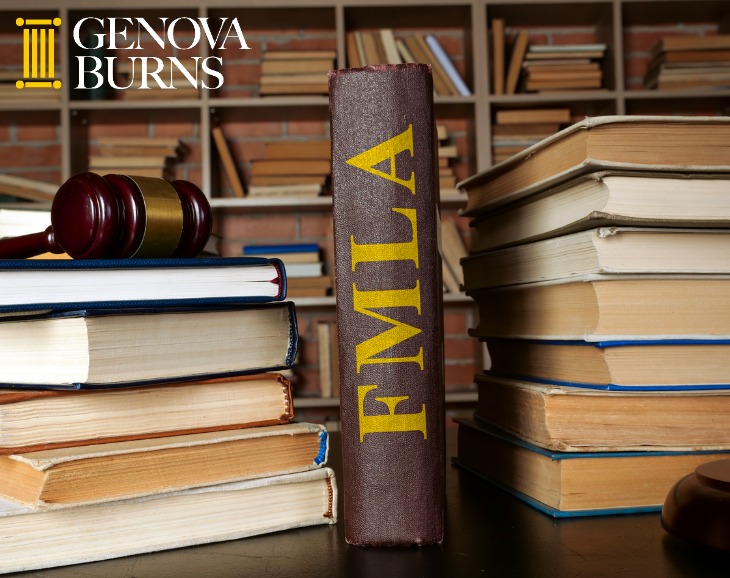Everyone’s Out of Bounds! NJ District Court Finds Employer’s Discretion in Managing Suspected FMLA Abuse is Limited by the Employer’s Lack of Proper Documentation
August 25, 2021 | By: Yostina Mishriky, Esq.
On August 6, 2021, the New Jersey District Court in Calio v. Camden County Board of Chosen Freeholders, denied motions by both an employer and an employee to resolve a dispute over abuse of leave under the Federal Family and Medical Leave Act (FMLA) and New Jersey Family Leave Act (NJFLA) rights. The FMLA and NJFLA give eligible employees job protected time off to care for family members with serious health conditions (among other rights). Here, the employee claimed that his employer interfered with his right to take job-protected intermittent leave by converting his absences to sick days and asking him to seek recertification of his FMLA leave. The District Court ruled that it could not dispose of the case in its early stages and could not find that the employer properly disciplined the employee for excessive absences, due in part, to the employer’s lack of proper documentation.
Facts
The Camden County Board of Chosen Freeholders d/b/a Camden County Department of Corrections, (the CCDC) employed Matthew Calio (Calio) as a corrections officer. Calio applied for FMLA in 2018 to care for his mother, who suffered from dementia. The CCDC approved Calio’s 2018 application for intermittent FMLA leave. The CCDC approved Calio to take leave up to one absence per month, for up to five days per absence, consistent with a medical certification provided by Calio.
Calio took FMLA on December 15, 2018, and then additional FMLA days on January 6, January 14, and January 28, 2019. On February 1, 2019, Calio’s supervisor, recommended Calio’s discipline for excessive FMLA use. Calio had only been approved for one occurrence per month (which would last up to five days), and his January 6 and January 28 absences exceeded his FMLA approval. On February 19, 2019, the CCDC provided Calio with two notices of disciplinary action, notifying him that he would be suspended as a result of exceeding the frequency of his allotted FMLA days on January 6 and January 28.
On March 12, 2019, Calio filed a lawsuit against the CCDC alleging violations of the FMLA and NJFLA. Before receiving this complaint, the CCDC converted Calio’s absences to sick days and asked Calio to seek recertification of his FMLA leave if his needs had changed (if he needed more leave than one occurrence per month). Recertification is a mechanism under the FMLA where if an employee’s needs for FMLA change, for instance, if an employee needs more leave than first authorized by a medical provider, the employee can submit, or the employer can require the employee to submit, updated medical information substantiating the need for more leave. The CCDC was unaware of Calio’s lawsuit at the time it made the decision to convert the two days at issue to sick leave.
The NJ District Court Weighs In
The issue before the Court was whether the CCDC properly disciplined Calio for taking FMLA in excess of that approved based on the medical certification, or if Calio failed to timely submit his recertification justifying additional leave. If Calio had failed to timely submit the recertification documentation, then the Court clarified that his FMLA would be excessive and the CCDC could properly discipline him. Both the CCDC and Calio had inconsistent accounts, and there was no dispositive documentation by the CCDC on the timing of its request for certification. Therefore, the Court ruled that it could not determine at this stage whether the CCDC improperly disciplined Calio, or if Calio instead forfeited his FMLA protections by failing to comply with the recertification request. In the absence of any clear documentation, the Court found that the case would proceed.
Bottom Line
This case proves invaluable instruction on the FMLA. First, the case makes clear that employers can manage suspected abuse of FMLA through the recertification process. The case also makes clear that the employer can discipline for excessive FMLA use if the employee fails to comply with requests for recertification. Finally, this case teaches the importance of documentation, and how a case can be won or lost on proper documentation.
For more information regarding this decision and best practices to implement effective policies and training to avoid complaints of interference with FMLA rights claims, please contact John C. Petrella, Esq., Chair of the firm’s Employment Law & Litigation Practice Group via email here or Brigette N. Eagan, Esq., Counsel in the Human Resources, Counseling & Compliance Practice Group via email here or 973.533.0777.
Tags: Genova Burns LLC • Yostina Mishriky • John C. Petrella • Brigette N. Eagan • FMLA • NJFLA • Family and Medical Leave Act • New Jersey


